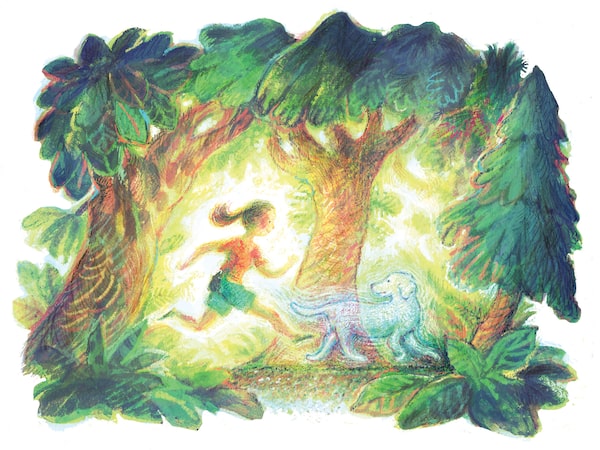First Person is a daily personal piece submitted by readers. Have a story to tell? See our guidelines at tgam.ca/essayguide.

Illustration by Juliana Neufeld
Near the end, Duke, my 14-year-old labrador, opened his eyes as I was trying to step over him quietly. With nothing more than his dimmed, slightly cataract covered eyes, he told me clearly, “You will need to help me out of this soon.” I was gutted.
More than a decade earlier my mother had voiced her opposition. “I read guys won’t date women with dogs because you’ll always prioritize the dog,” she said. I didn’t care. I had seen one grainy picture of two-year-old Duke, sitting on grass, looking out of the frame. He was a service dog program dropout, suffered acute separation anxiety and had a manageable skin condition. I couldn’t wait to bring him home.
He took to falling asleep on top of me while we watched TV, spreading his 90 pounds on my legs, stomach and neck. He kicked and chirped through dog dreams, sometimes so aggressively he would slightly gash my chin.
We started running together, often for an hour or more on forest trails or by the ocean. Once, while we ran over one of the city bridges, a rare lightning storm moved in. Worried his dog tag would be a conductor, I ripped the collar off his neck and tied it around mine. Perhaps not the best plan, but we made it home as lightning forked around us the entire way.
A co-worker once told me he didn’t think it was possible to love an animal as much as I claimed to love Duke. I explained it by saying, “You never want to be in a situation where both you and Duke are falling off a cliff and your only hope of survival is me, and I can only save one of you.” He laughed as though I was kidding.
The first time I took Duke with me to visit my mother in the hospital, she was wearing an oxygen mask and was hooked up to various machines. He froze, peed a little, then assumed the role of protector and didn’t leave my side. We stayed by her bed for three days, leaving only for short breaks to play on the grass outside her window. In the hospital one evening we were stopped by a woman whose elderly father was in a neighbouring room. Could Duke pay a visit? Of course! Even though his front paw almost ripped out the IV line when he clumsily jumped up on the bed, the man beamed while Duke licked his face, inching closer and closer, as if to deliver the message everything would be okay.
As he got older, Duke developed a fear of shiny floors. Tiles, polished cement and linoleum became no-go zones. But then my sister, diagnosed with an aggressive form of MS, had to move into an assisted living facility – where the floors were shinier than the set of Jeopardy. This was only two years after my Mom died. Somehow, Duke understood he needed to conquer that fear and help me. My dog, the one that treated every other smooth surface like it was quicksand, walked into the care home like he owned it. Not one flinch for the following two years, until the minute my sister was gone.
When I had a surprise pregnancy in my mid-40s and a not-so-surprise miscarriage, I told no one. Instead, it was Duke who sat next to me, unmoved as I kneaded his skin with a bit too much force. The service dog school dropout sat stoic and strong while I buried my head in his fur and howled, overwhelmed by competing feelings of relief and regret. At one point he moved slightly, to rest his jowl on my shoulder.
A few months after his 13th birthday, we were walking on the kilometres of sand at low tide, something we had done hundreds of times, when his legs started giving out. As I carried him the final few metres to the car, it sunk in that we were having our last summer together.
Duke died three months ago. I knew it was coming, but as anyone who has ever experienced this knows there is no way to prepare.
There is a surprisingly large amount of research into why people are often more destroyed when we say goodbye to our dogs compared to when we lose our humans. A friend sent some to me because she knew I needed to understand why Duke’s death shredded me more than when I said goodbye to my mom and my sister. She knew I couldn’t navigate losing him, without him. The more I read, the more I understood. It’s a different love. It’s pure and unconditional and 100 per cent happiness. It doesn’t make the loss any easier, but it does help accept the weight of it. And it explains why the love of my life is, and will always be a yellow lab named Duke.
Jill Bennett lives in Vancouver.